
The politics of Zimbabwe occurs in a society deeply divided along lines of race, ethnicity, gender and geography. The ZANU–PF party has historically been dominant in Zimbabwe politics. The party, which was led by Robert Mugabe from 1980 to 2017, has used the powers of the state to intimidate, imprison and otherwise hobble political opposition in Zimbabwe, as well as use state funds and state media to advance the interests of the party.
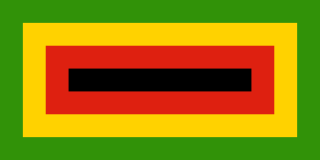
The Zimbabwe African National Union – Patriotic Front (ZANU–PF) is a political organisation which has been the ruling party of Zimbabwe since independence in 1980. The party was led for many years by Robert Mugabe, first as prime minister with the Zimbabwe African National Union (ZANU) and then as president from 1987 after the merger with the Zimbabwe African People's Union (ZAPU) and retaining the name ZANU–PF, until 2017, when he was removed as leader.
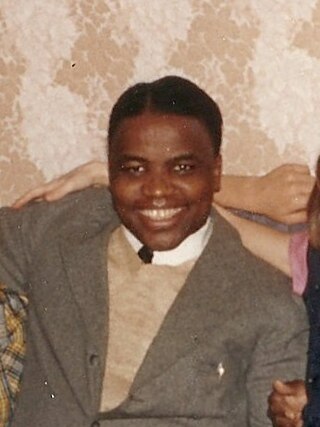
Ndabaningi Sithole was the founder of the Zimbabwe African National Union (ZANU), a militant, nationalist organisation that opposed the government of Rhodesia, in July 1963. Sithole's father was Ndau and his mother was Ndebele. He worked as a United Church of Christ in Zimbabwe (UCCZ) minister. He spent 10 years in prison after the government banned ZANU. A rift along tribal lines split ZANU in 1975, and he lost the 1980 elections to Robert Mugabe.

Edgar Zivanai Tekere, nicknamed "2 Boy", was a Zimbabwean politician. He was the second and last Secretary General of the Zimbabwe African National Union (ZANU) who organised the party during the Lancaster House talks and served in government before his popularity as a potential rival to Robert Mugabe caused their estrangement.
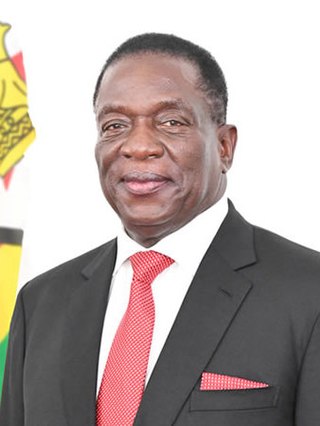
Emmerson Dambudzo Mnangagwa is a Zimbabwean politician who is serving as President of Zimbabwe since 24 November 2017. A member of ZANU–PF and a longtime ally of former President Robert Mugabe, he held a series of cabinet portfolios and was Mugabe's Vice-President until November 2017, when he was dismissed before coming to power in a coup d'état. He secured his first full term as president in the disputed 2018 general election. Mnangagwa was re-elected in the August 2023 general election with 52.6% of the vote.

General elections were held in Southern Rhodesia between 14 February and 4 March 1980 to elect the members of the House of Assembly of the first Parliament of the independent Zimbabwe. As stipulated by the new Constitution of Zimbabwe produced by the Lancaster House Conference, the new House of Assembly was to comprise 100 members, 80 of whom would be elected proportionally by province by all adult citizens on a common roll, and 20 of whom would be elected in single-member constituencies by whites on a separate roll.

General elections were held in Zimbabwe on 23 March 1990 to elect the president and Parliament. They were the first elections to be contested under the amended constitution of 1987, which established an elected executive presidency and abolished the Senate. They were also the first ever elections in the country to be contested on a single roll, with no separate voting for whites and blacks.
Simbarashe Herbert Stanley Makoni is a Zimbabwean politician and was a candidate for the March 2008 presidential election against incumbent Robert Mugabe. He was Minister of Finance and Economic Development in President Robert Mugabe's cabinet from 2000 to 2002. He faced strong opposition during the Economic Change in Zimbabwe in the early 2000s as his policies contradicted those of the rest of the ZANU-PF party.

Presidential elections was held in Zimbabwe on 16 and 17 March 1996. The elections were contested by the incumbent President Robert Mugabe, Zimbabwe Rhodesia-era Prime Minister Abel Muzorewa, and ZANU–Ndonga leader Ndabaningi Sithole. Mugabe won, claiming over 90% of the vote, though turnout was just 32.3%, largely as a result of Sithole and Muzorewa withdrawing their candidacies shortly before the election due to threats of violence.
Patrick Kombayi was a Zimbabwean businessman, a former mayor of Gweru and an active member of the Movement for Democratic Change-Tsvangirai faction in the Midlands Province. He served in the Senate of Zimbabwe for the Chirumhanzu-Gweru senatorial constituency. Kombayi, a student of Robert Mugabe, was the first black train driver in Zimbabwe. He joined Rhodesia Railways after pursuing an unsatisfying career as a schoolteacher. Posted to Zambia, Kombayi became involved with the Zimbabwe African National Union.
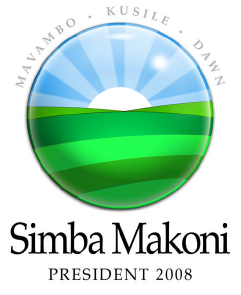
In January, 2008 the BBC reported that Simba Makoni might be nominated to run against Robert Mugabe in the Zimbabwean 2008 presidential election.

Zimbabwe Electoral Commission (ZEC) is an independent Chapter 12 institution established in terms of Section 238 of the Constitution of Zimbabwe; which is responsible for the management and administration of Zimbabwe's electoral processes. It was initially established by the act of Parliament in 2004, with influence from its predecessor, the Electoral Supervisory Commission as well as the Southern African Development Community.

Robert Gabriel Mugabe was a Zimbabwean revolutionary and politician who served as Prime Minister of Zimbabwe from 1980 to 1987 and then as President from 1987 to 2017. He served as Leader of the Zimbabwe African National Union (ZANU) from 1975 to 1980 and led its successor political party, the ZANU – Patriotic Front (ZANU–PF), from 1980 to 2017. Ideologically an African nationalist, during the 1970s and 1980s he identified as a Marxist–Leninist, and as a socialist after the 1990s.
The second round of voting in the Zimbabwean presidential election of 2008 was held between Robert Mugabe and Morgan Tsvangirai after the first round failed to produce a 50% majority for either candidate. The election process was marred by violence against and intimidation of voters and party workers, which eventually led to the withdrawal of Tsvangirai from the poll. This left Mugabe as the winner of, effectively, a one-candidate election.
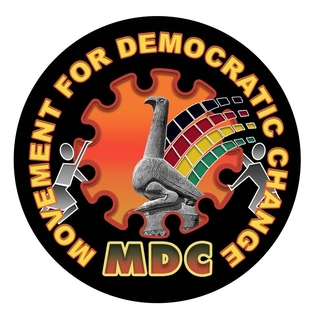
The Movement for Democratic Change – Tsvangirai (MDC–T) is a centre-left political party and was the main opposition party in the House of Assembly of Zimbabwe ahead of the 2018 elections. After the split of the original Movement for Democratic Change in 2005, the MDC–T remained the major opposition faction, while a smaller faction, the Movement for Democratic Change – Ncube, or MDC–N, was led by Welshman Ncube.

Presidential elections were held in Zimbabwe between 9 and 11 March 2002. The elections were contested by the incumbent president Robert Mugabe, Movement for Democratic Change leader Morgan Tsvangirai, ZANU–Ndonga leader Wilson Kumbula, Shakespeare Maya of the National Alliance for Good Governance and independent candidate Paul Siwela. Although Mugabe won with 56.2% of the vote, it was the closest presidential election to date.
The United Parties (UP) was a political alliance founded in Zimbabwe in 1994 led by retired Bishop Abel Muzorewa. An amalgamation of Muzorewa's former party, the United African National Council, and a Matebeleland and Masvingo-based faction of the Forum Party which had been formed in 1993. For a short period, the UP also received members from the Zimbabwe Unity Movement, the party founded by former ZANU–PF secretary general Edgar Tekere in 1989.

General elections were held in Zimbabwe on 29 March 2008 to elect the President and Parliament. Because of Zimbabwe's dire economic situation, the elections were expected to provide incumbent President Robert Mugabe with his toughest electoral challenge to date. Mugabe's opponents were critical of the handling of the electoral process, and the government was accused of planning to rig the election. Human Rights Watch said that the election was likely to be "deeply flawed."
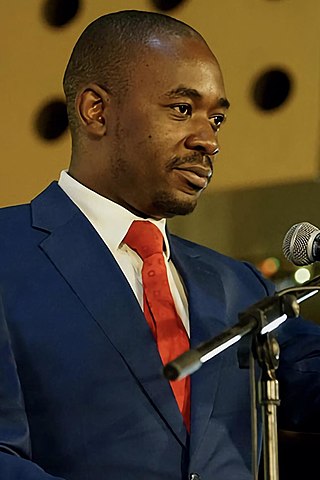
General elections were held in Zimbabwe on 30 July 2018 to elect the President and members of both houses of Parliament. Held eight months after the 2017 coup d'état, the election was the first since independence in which former President Robert Mugabe was not a candidate.
Elections were held in Zimbabwe on 23 March 1990 to elect the President and Parliament. Robert Mugabe of the Zimbabwe African National Union – Patriotic Front (ZANU–PF) was reelected President with 83 percent of the vote against Edgar Tekere of the Zimbabwe Unity Movement, who received 17 percent. ZANU–PF won 117 of the 120 elected seats in Parliament, which after the abolition of the Senate in 1989 consisted of the unicameral House of Assembly.












